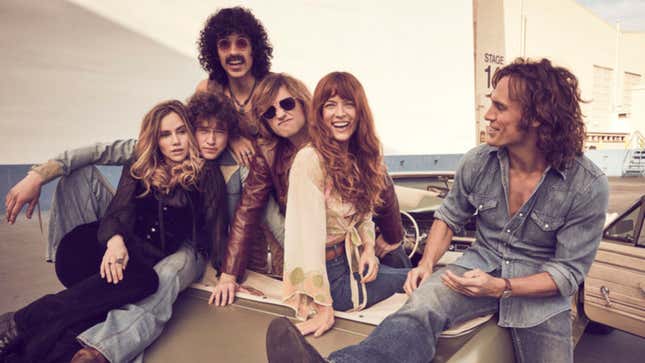Remember ‘Daisy Jones & The Six’ for Its Music. Try to Forget Everything Else.
Riley Keough soars in a just-OK Amazon Prime show based on the bestselling novel about the greatest band to never actually exist.
EntertainmentTV

The first three episodes of Daisy Jones & The Six are not good. In one of the earliest scenes, Daisy Jones, born Margaret (and played by Riley Keough), sits on the bed in her childhood home—a deeply unhappy home with a mom who considers her an “inconvenience” and “competition,” and a dad who’s hardly mentioned except to say that he has lots of money. But then, then, Daisy discovers she can write. So she journals and writes songs and “finds a piece of me that I didn’t know was missing,” and these first three episodes feel like exactly that: a stereotypical rags-to-rock-god fantasy ripped from the diary of a lonely 15-year-old. And it’s not even Penny Lane’s diary.
But. If you can stomach it through the way-too-drawn-out backstories (people’s parents fuck them up, they find music, they love music, they decide to make music, we get it) and the cheesy platitudes (“Trust isn’t easy, in fact, it’s one of the hardest things you will ever have to do”), you’ll be rewarded with something not-so-cheesy and not completely terrible.

Daisy Jones & The Six (streaming on Amazon Prime now) is about the meteoric rise and astronomic fall of a fictional 1970s rock band. It is based on Taylor Jenkins Reid’s bestselling 2019 novel of the same name—which gave the project both a ton of potential and seemingly way too big of a universe to populate. And it’s really hard to pinpoint how exactly the material, often categorized as Fleetwood Mac fan fiction, failed to deliver what should have been the next Almost Famous.
-

-

-

-

-

-

-

-

-

-

-

-

-

-

-

-

-

-

-

-

-

-

-

-

-

-

-

-

-

-

-

-

-

-

-

-

-

-

-

-








































